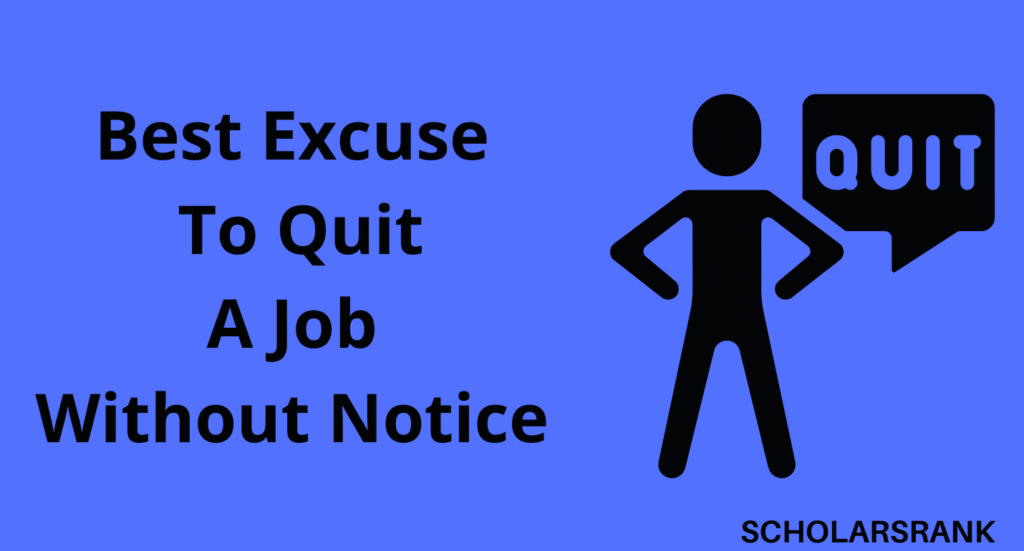Introduction
Have you ever considered what is the best excuse to quit a job without notice? When a workplace just doesn’t feel right, you know in your mind that it’s time to leave. There are many different reasons why you might need to leave a job, whether you’ve held it for months or years.
HR managers and business executives were asked for some reasons why employees might quit their job without notice to assist you in identifying justifications that make it acceptable to do so. There are several situations in which an employee may resign from their position without giving any previous notice, including being requested to execute unlawful conduct or having their health or well-being threatened.
You are typically required to work the notice time provided in your contract while quitting your employment. But occasionally it might not be possible or perhaps the best course of action to not give notice.
What Is A Notice Period?
A notice period is the amount of time you need to give your employer before quitting your job. As an alternative, your employer must provide you fair notice before your job ends if they provide a letter of dismissal or redundancy.
Notice periods are in place so that your company has time to locate a replacement and you have time to find other work.
How Do I Find Out My Notice Period?
Depending on your position, the business you work for, and any provisions in your contract or employee handbook, your notice period may vary. If you’re still undecided, ask the human resources department of your employer for guidance on the length of your notice period.
Your job and the organization you work for will both influence how lengthy your notice period is. The notice time maybe a week or a month for some, but it may be lengthier for senior positions. You have the option to notify your employer in advance of the termination date specified in your contract if you so want.
Before Quitting My Job, Do I Need To Give Notice?
You are required to give your employer notice if you plan to leave your position. Although the employer may have its own notice time, which should be outlined in your contract, you normally have to give one week’s notice if you’ve been working for them for more than a month.
You should discuss this with your employer if you want to work fewer hours than your notice period allows. If you do not adhere to the terms of your contract, your employer may choose to take legal action against you, especially if they believe your departure would result in financial loss.
When Is It Appropriate To Leave Without Giving Notice?
Most people have at-will employment contracts, which implies neither the employer nor the employee is required to give a termination notice. Although it is not legally necessary, most companies prefer two weeks’ notice to allow them to redistribute your duties and find a replacement for you.

Nevertheless, there are some situations in which giving your notice is optional or even required, such as:
- Working In An Unfriendly Environment
It’s acceptable to quit a toxic work environment if necessary before transferring to a good one. Your mental health may be impacted and things may become more difficult for you as a result of any discrimination and harassment you may experience at work. By staying a further two weeks and suffering needless abuse, you can even damage your professional ties. If your supervisor or colleagues harass you, giving two weeks’ notice won’t often help your career.
- Dangerous Working Conditions
If your safety is in danger, you do not need to give a cause. Courtesy isn’t important when you have a hazardous job, especially if your boss has already dismissed your safety concerns. Your business has to uphold workplace safety regulations, and two weeks of transitioning are not worth sacrificing your health and happiness.
- Emergency At Home
Employers value families, so if you have to leave work early to care for them, they won’t hold it against you. While traveling to work during a family emergency can be challenging, your former employer will eventually be understanding and might even provide a positive reference. Informing your employer that you are taking a leave of absence will help you avoid quitting your job permanently. If you leave your job abruptly, you can be eligible for FMLA.
- Short-Term Employment
If you have recently been hired but have not yet been onboarded, there may be insufficient time to accomplish much over the next two weeks. When you immediately realize the position is not ideal for you, quitting without giving notice might be the wisest course of action. You can save your employer time and focus on obtaining a job that’s better for you by not training someone who is departing immediately. Discuss the situation openly with your manager. This would be advantageous for everyone involved.
- Layoffs Happen Frequently.
A business that needs to make cuts is probably looking for ways to do so. It might prefer not to pay a departing employee for two more weeks. Additionally, layoffs will likely cut your two weeks short, so it could be advisable to delay your resignation until you’ve secured a new job. If you leave without giving your employer two weeks’ notice and they are debating how and when to keep you or perhaps another employee, you might still be able to do so amicably.
- Ethics-Related Challenges
If your employer demands unethical activity, you may need to quit your employment immediately. If there is a morally corrupt corporate culture, it could be impossible to uphold your professional standards. Your career and personal lives may be more negatively impacted by unethical activity than by departing without two weeks’ notice.
- Your Current Condition Of Health
When determining whether to leave your job suddenly, you should always take into account both your mental and physical health. If waiting any longer would impact your health, make your current leave as soon as you can and concentrate on having to take care of yourself. Staying in a job for two additional weeks may not be necessary if work-related stress prevents you from adjusting your working conditions or working-life balance.
- Not Enough Jobs Are Available.
Although giving two weeks’ notice is ideal, if your work schedule is extremely busy or you spend the bulk of your time on administrative tasks, you can think about leaving without giving any notice. Even if you have a normal schedule at a company with a high turnover of employees, your employer might not require you to work the full two weeks. If you get along well with your manager, you might be allowed to provide less notice. In your job, there are not enough tasks for you to do.
- Possibilities For Growth
If your next employment offer or chance is time-sensitive, thoroughly think it over. Take it, don’t allow your soon-to-be-ex-employer to stop you. It’s not always a good idea to leave your work two weeks early if you currently have your dream position secured, especially if you want to use your present company as a reference later on. If you have a flexible working schedule and you have a strict time limit to meet for your new employment, it could be best if you left right away.
Best Excuse To Quit A Job Without Notice
Giving the appropriate length of notice, which is often two weeks, following your contract, is the professional approach to leaving a job.
However, there are situations when you simply need or want to leave a job without giving notice but are unable to disclose the exact reason to your employer.
If you find yourself in this circumstance, I can suggest several potential justifications for quitting your work immediately.
The top reasons to leave a job without notice are listed below:
- Mention You Have A Family Emergency
The fact that they are frequently difficult to refute and necessitate quick response places family emergencies among the most common justifications for leaving without giving notice.
However, be careful that it can backfire on you if your supervisor is not understanding or if they learn it was not a true emergency.
However, if handled appropriately and sincerely, this may be a good reason to leave without giving notice.
I’ll leave it up to your conscience whether you decide to make up a narrative or keep it quiet.
- Cite Personal Issues
Since you are not required by law to provide specifics if you don’t want to, some people are okay with invoking “personal” difficulties as an excuse.
This can indicate several different things, but it essentially informs your manager that something urgent that is not related to work has arisen and requires your immediate attention.
Use it at your own risk; it’s somewhat of a cop-out and could boomerang if the employees you got along with are concerned about you.
- Say You’re Stressed Out About Your Job
Stress is a very serious issue that can make you want to give up and not work one more day.
Remember that this is an excuse that could result in a lot of inquiries from your employers and be met with resistance.
However, if you tell your company that you’re too stressed out, they won’t ask you to work through your notice, even though it may be true and is something you care deeply about.
- Express Your Unease About Your Safety at Work
Although you might need to provide evidence, saying that you don’t feel safe at work is a good excuse for staying outside.
However, you might leave this open-ended if you only intend to use it as an excuse to avoid speaking with your firm again.
Remember that it’s a significant justification that would call for your employer to intervene, and they might not want the attention it would bring.
- Say You Have A Job That Must Begin Right Away.
This is another common justification that isn’t accepted at all in some workplaces but is accepted in workplaces where your supervisor is supportive of your career.
You must exercise your discretion regarding this matter and any potential repercussions.
If you do decide to utilize it, though, be aware that you’ll probably end up destroying some relationships.
- Say You’ve Won A Lifetime Holiday and Leaving Immediately
This is a funny excuse, but there are known folks who have used it to get out of a job quickly and make their coworkers envious!
It won’t work in the long run and might be difficult to prove, but it can buy you more time while you consider your options.
However, utilize it at your peril because some employers won’t find this as amusing if they find out you were lying as opposed to others.
- Declare Having Health Issues
As you’re suggesting – or saying – that you physically can’t work your notice, health difficulties are a highly solid excuse for leaving without giving notice.
But if it’s not true, it will be challenging to demonstrate this if necessary.
If you decide to use this excuse, be prepared for your employer to request a doctor’s note or other documentation of the health concern.
However, it’s a genuine cause that your employer won’t question, and if they’re sympathetic, they just might offer to assist.
A Professional Way to Quit Without Notice
If you need to give two weeks’ notice but are unable to, the methods listed below can help you quit your employment successfully.
- Recognize The Hazards
Recognize the hazards Avoid leaving abruptly unless you have no other choice. Without giving your employer any warning, you risk having your relationship with them dissolved and risk having a bad reference or image in your profession.
- Be Concise In All Of Your Conversations.
Please take note that even if you are unable to give your employer two weeks’ notice, you may still do so. Please let your manager know if you will not be able to work or when your final day will be. The best way to inform them is in person, however, a phone call, a letter, or an email will do. Those that get along well with their management might want to let them know why they’re quitting.
- Always Be Considerate
Be kind and professional while announcing your resignation. Even if they don’t improve your professional reputation, respect your management. Instead of blaming anyone, you should be diplomatic in your explanation of your decision to leave and concentrate on the facts. If the scenario is high-conflict, it could be preferable for you to communicate in writing so that you can be professional while still being polite.
- Recognize The Circumstance
Recognize that if you leave without giving your employer a notice period, the scenario is not ideal. It would be a smart option if you could aid in the role transfer during your last few hours or days. By acknowledging your manager’s difficulties and expressing regret for the inconvenience, you can foster a positive connection.
- Contact The Human Resources Division
Once you have left your employment, the next step is to get in touch with Human Resources to obtain your final paycheck and any unpaid benefits. If you leave because of problems at work, an exit interview may also be planned. You can offer helpful criticism there. To ensure that all paperwork and cheques are sent to the right place, you must provide them with your most recent contact information.
Can A Company Reject An Immediate Resignation?

An employer has the right to reject an immediate resignation. In the end, it depends on the rules and regulations of the company. Before an employee leaves their work, the employer could additionally compel them to give a specified length of notice.
In such circumstances, the employer might make an effort to talk the employee into staying with the business for a specific amount of time. But in the end, the decision to accept an instant resignation rests with the employer.
Though it’s not like your employer may make your report to work, this does not imply that you are not free to quit and not work your notice. You must carefully consider your actions since they might decide to take legal action against you.
Conclusion
Before thinking of the best excuse to quit a job without notice, It’s crucial to consider your next steps when quitting a job unexpectedly.
Of course, your strategy will vary depending on your motives for leaving, but it could be useful to consider things like whether you have enough money saved to pay expenses for a while, what monetary compensation you might be eligible for, and whether you can start looking for alternative jobs right away.
If you want to seek new work, check your agreement to see if there are any restrictions on the type of employment you can apply for or when you may start new employment. Another issue to think about is how you’ll explain to potential employers why you left your job abruptly. Frequently asked question during interviews is “why did you quit your last job?” Having a prepared speech will help you articulate your response rather than fumbling through it.
The most crucial thing to keep in mind is not to decide in a hurry. Deciding to quit your work without giving notice is a huge one, so having a strategy will help you make sure you’ve considered all your options.
Frequently Asked Questions (FAQs)
Is It Acceptable To Leave Without Providing Any Advance Notice?
- Yes, it’s acceptable to leave abruptly. Although morally sound, the choice is sound. Even if you have legitimate reasons for leaving your job, it could be difficult for your employer to find a replacement or to give your tasks to someone else who isn’t capable of handling the task.
Why Would You Need To Quit Your Current Job?
- There are a variety of reasons you might wish to leave your current employment. such as when your wage package is inadequate, you are experiencing problems with your supervisor, or your workload becomes too much for you to handle. Whatever the motivation, you must consider the effects of your actions. For instance, if a better opportunity arises or if you have obligations to your current employer under a contract that must be fulfilled.
What Happens If I Quit My Job Without Any Notice?
- Nothing negative occurs that could harm your career. But bear in mind that you can lose a solid professional reference for a future job and that your reputation could suffer significantly.
You can also read, “Civil Engineers Resignation Letter“








